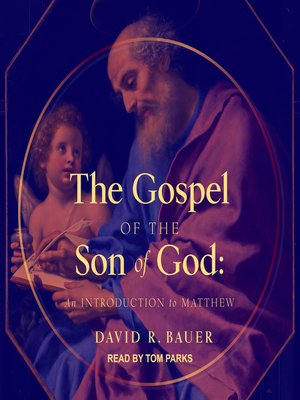
Sign up to save your library
With an OverDrive account, you can save your favorite libraries for at-a-glance information about availability. Find out more about OverDrive accounts.
Find this title in Libby, the library reading app by OverDrive.



Search for a digital library with this title
Title found at these libraries:
| Library Name | Distance |
|---|---|
| Loading... |
From beginning to end, the very structure of the Gospel of Matthew emphasizes that Jesus is the Son of God.
At climactic points Jesus is so identified—by Peter, by a Roman centurion, by Jesus himself, and by God the Father. With The Gospel of the Son of God, David Bauer provides a comprehensive introduction to this Gospel that has been so foundational to the Christian church. Arguing that the nature of Matthew itself should provide us with the framework for its study, he presents a holistic inductive approach with a literary, theological, and canonical focus.
In the first section on orientation, Bauer explores issues of genre, interpretive methods, authorship, audience, and literary structure. Then he moves to interpretation, guiding listeners through the meaning of sections of the text. Finally, the reflection section synthesizes and develops major theological themes emerging from the interpretation.
While providing a sound basis for the study of Matthew, Bauer goes beyond typical introductory issues to draw out the rich theological vision of the Gospel. His careful scholarship and clear exposition will make this a valuable resource for college and seminary students and pastors.
At climactic points Jesus is so identified—by Peter, by a Roman centurion, by Jesus himself, and by God the Father. With The Gospel of the Son of God, David Bauer provides a comprehensive introduction to this Gospel that has been so foundational to the Christian church. Arguing that the nature of Matthew itself should provide us with the framework for its study, he presents a holistic inductive approach with a literary, theological, and canonical focus.
In the first section on orientation, Bauer explores issues of genre, interpretive methods, authorship, audience, and literary structure. Then he moves to interpretation, guiding listeners through the meaning of sections of the text. Finally, the reflection section synthesizes and develops major theological themes emerging from the interpretation.
While providing a sound basis for the study of Matthew, Bauer goes beyond typical introductory issues to draw out the rich theological vision of the Gospel. His careful scholarship and clear exposition will make this a valuable resource for college and seminary students and pastors.







